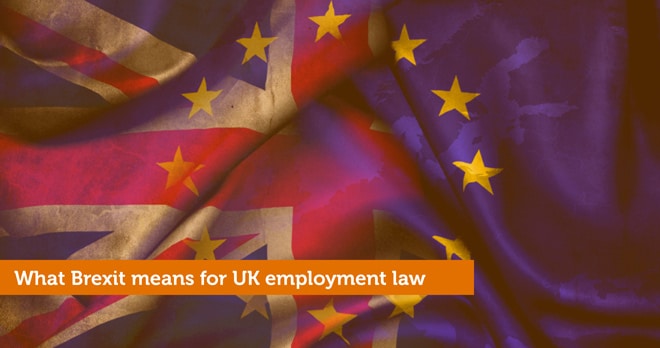What Brexit means for UK employment law

There was consensus on the following:
- there will be little change to employment law in the short term
- economic volatility will impact short to medium term on business investment and recruitment strategy
- in the next 2-3 years, any significant restriction to free movement of workers rules will substantially affect some businesses over others – multi-nationals with UK-bases to facilitate trade with Europe, farmers requiring seasonal labour, and high-tech/IP being just some of the sectors expressing significant concerns
- the nature of any changes will depend on our future relationship with the EU – within or without EFTA, subject or not subject to EU free movement and social chapter regulations.
Of course, the uncertainty and potential political and economic volatility in the next few years means that for many businesses and individuals, commercial strategy will dominate, with employment law concerns far down the priority agenda. And if we remain closely linked to the EU, there may be little substantive change. But, if our relationship with Europe becomes one of a WTO trading country which is not subject to EU Regulations and Directives, then UK employment law will substantially be in the hands of government to decide.
What could this mean?
Many advocates of Brexit in the government have been heavily critical of European Court judgments and some EU Regulations and Directives and have in the past advocated significant changes to employment law – from TUPE, holiday pay, Agency Worker Regulations to (more controversially) maternity rights.
Any government will now consider that it has a significant mandate to make large-scale changes, with some senior Brexit politicians having long-term interest in the US model of a more flexible workforce with fewer individual rights. And of course, future governments of different political persuasions may have a very different position, so there is a prospect of significant employment law changes based on election cycles. Economic volatility will also have an impact on how and when change will be made.
So what is our view?
That over the next five years all kinds of businesses will face significant change and uncertainty, and opportunity, and our economy will undergo significant change. Part and parcel of this will be real changes to employment law, but in what direction will be up to the electorate to determine. The electorate having a direct say in electing a government that can make radical changes to employment law? Whatever next!